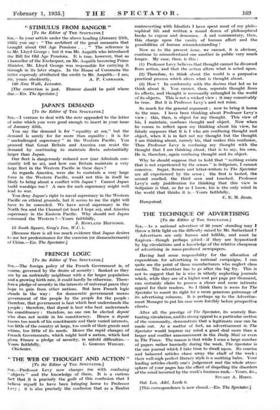" THE WEB OF THOUGHT AND ACTION "
[To the Editor of THE SPECTATOR.]
sia,—Professor Levy now charges Me with. confusing
objects " and the knowledge of them. It is a curious fact that " it is precisely the .guilt of this confusion that I believe myself to have been bringing home to Professor Levy ; it is also precisely the confusion that as a Realist controverting with Idealists I have spent most of my philo- sophical life and written a round dozen of philosophical books to expose and denounce. A sad commentary, then,• this charge upon the vanity of human effort and the possibilities of human misunderstanding !
Now as to the present issue, we cannot, it is obvious, continue to misunderstand one another in public very much longer. My case, then, is this :
(1) Professor Levy believes that thought cannot be divorced from action,-and that the action alters what is acted upon.
.(2) Therefore, to think about the world is a purposive practical process which alters what is thought about.
(3) How ? In conformity with the desires that led us to think about it. You cannot, then, separate thought from its effects, and thought is necessarily entangled in the world of its objects. This is not a wicked view ; it may conceivably be true. But it is Professor Levy's and not mine.
So much for the general argument ; now to bring it home to the man. I have been thinking about Professor Levy's view ; this, then, is object for my thought. This view of his, I maintain, confuses thought and object. Now when he comes to reflect upon my thinking about his view, he falsely supposes that it is I who am confusing thought and object, when it is in fact not my thought but the thought I am thinking about, namely his, that makes this confusion. Thus Professor Levy is confusing my thought with the thought that I am thinking about, that is to say, his own. He is, therefore, again confusing thought and its object.
Why he should suppose that to hold that " nothing exists that is not experienced by the senses " is Solipsism, I cannot conceive. Sugar, flowers and letter-writers to The Spectator are all experienced by the sense ; the first is tasted, the second smelled, the third seen and touched. Professor Levy's only justification for thinking that this view is Solipsism is that, so far as I know, his is the only mind in the world that thinks it is.—Yours faithfully, C. E. M. J0102.
Hampstead.














































 Previous page
Previous page